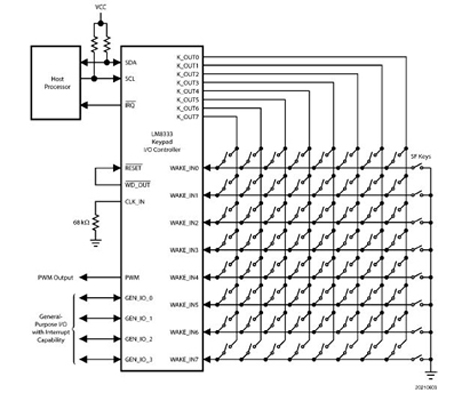The LM8333 from National Semiconductor Mobile I/O Companion offloads the burden of keyboard scanning from the host, while providing extremely low power consumption in both operational and standby modes. It supports keypad matrices up to 8 × 8 in size (plus another 8 special-function keys), for portable applications such as cellphones, PDAs, games, and other handheld applications.

Key press and release events are encoded into a byte format and loaded into a FIFO buffer for retrieval by the host processor. An interrupt output (IRQ) is used to signal events such as keypad activity, a state change on either of two interrupt-capable general-purpose I/O pins, or an error condition. Interrupt and error codes are available to the host by reading dedicated registers.
Four general-purpose I/O pins are available, two of which have interrupt capability. A pulse-width modulated output based on a host-programmable internal timer is also available, which can be used as a general-purpose output if the PWM function is not required.
To minimize power, the LM8333 automatically enters a low-power standby mode when there is no keypad, I/O, or host activity.
The device is packaged in a 32–pin Leadless Leadframe package (LLP) and a 49-pin MICRO-ARRAY . Both are chip-scale packages.
-
8 × 8 standard keys
-
8 special function keys (SF keys) providing a total of 72 keys for the maximum keyboard matrix
-
ACCESS.bus (I 2C-compatible) communication interface to the host
-
Four general purpose host programmable I/O pins with two optional (slow) external Interrupts
-
16 byte FIFO buffer to store key pressed and key released events
-
Error control with error reports on (FIFO overrun, Keypad overrun, invalid command)
-
Host programmable PWM
-
Host programmable active time and debounce time